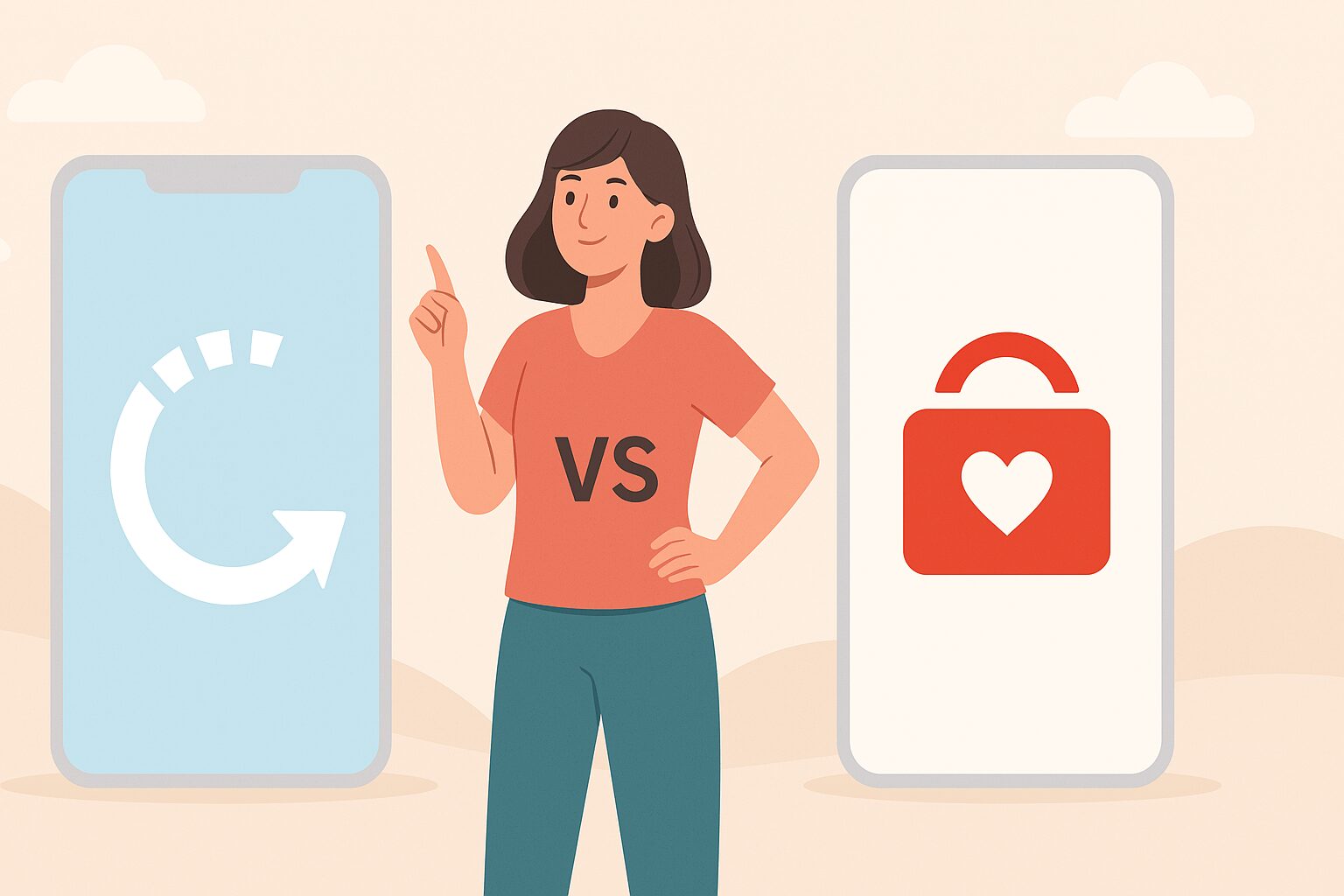
Trying to understand the complex web of symptoms, triggers, treatments, and lifestyle factors that shape your health can feel like navigating a maze. Digital health apps promise to be a guiding thread, helping you log your experiences and hopefully uncover patterns. Two options you might encounter are the established health journal app Symple and the comprehensive health management platform CareClinic. While both aim to help you track your health, they offer fundamentally different approaches and capabilities.
Which one provides the deeper insights needed to manage chronic conditions truly and have more productive conversations with your doctor? Let’s compare.
The Core Difference: Logging Your Day vs. Managing Your Health
Understanding the underlying philosophy of each app helps in selecting the most suitable option.
Symple presents itself as a well-being journal. Its primary focus is on symptom tracking, accompanied by customizable “factors” such as diet and activity or other daily variables. Users are encouraged to create a health diary by noting how they feel each day and identifying any factors that may be influencing those feelings. The app’s strength lies in a minimal feature set for those interested in daily logging of minimal amounts of data.
CareClinic serves as a more comprehensive health management platform. While it includes the ability to log symptoms and lifestyle factors, it also integrates features for identifying trends, evaluating treatment plans, setting goals, and accessing clinically relevant resources. Users can collaborate with caregivers or healthcare providers directly within the app. Rather than serving only as a record-keeping tool, it functions as a system that supports decision-making and ongoing health engagement.
Capturing Your Daily Reality: How Tracking Works Day-to-Day
How easy is it to record your health information, especially on difficult days?
The Symple Approach: Factors and Journaling
Symple encourages users to track symptoms and relevant “factors.” This might include noting:
- Symptoms experienced (like headache, fatigue, nausea)
- Factors potentially influencing symptoms (e.g., logging “gluten intake,” “prednisone,” “meditation,” “poor sleep”)
- Using timestamped photos as part of the record (perhaps showing a meal or a skin rash)
- Reviewing past entries using an interactive calendar
The app structure appears geared towards creating a daily log or diary entry. While flexible in letting users define their own “factors,” this approach means tracking different health domains (like medications vs. diet vs. activity) occurs within the same general framework, potentially limiting the depth and structure for specific data types.
The CareClinic Approach: Dedicated, Integrated Modules
CareClinic uses a more structured, modular approach. Instead of general “factors,” it provides dedicated sections for key health areas, each with specialized tracking options:
- Symptom Tracker: Detailed logging with intensity scales, body mapping, quality descriptors, patterns.
- Medication Tracker: A robust system for scheduling, effectiveness/side effect monitoring, interactions (more below).
- Nutrition Tracker: Log meals, track macros/micronutrients, correlate foods with symptoms.
- Activity Tracker: Log specific exercises, duration, intensity, and impact on symptoms.
- Sleep Tracker: Monitor duration, quality, stages, and disruptions.
- Mood Tracker: Detailed emotion tracking with context and intensity.
- Measurements: Track vitals like blood pressure, weight, and blood glucose.
- Factors: A customizable section for anything not covered elsewhere.
This structured approach allows for much deeper, more specific data collection within each category. Furthermore, CareClinic’s modular interface means you can *hide* any modules you don’t need, keeping your dashboard simple and focused only on what’s relevant to you, preventing overwhelm despite the comprehensive options.
Medication Tracking: A Simple Log or a Management System?
For many with chronic conditions, medication tracking is non-negotiable.
In Symple, medications are typically tracked as one type of “factor.” You can log that you took a medication (e.g., “took Lisinopril 10mg”) and potentially add notes. This provides a basic record of what was taken but lacks the features needed for active medication management, such as complex scheduling, automated effectiveness tracking against specific symptoms, side effect monitoring, or interaction warnings.
CareClinic offers a dedicated, pharmaceutical-grade Medication Management system. Key features include:
- AI-powered medication import (scan prescriptions)
- Handling complex schedules (tapering, variable timing, as-needed)
- Tracking effectiveness for *specific symptoms* (e.g., how well did Sumatriptan reduce *this specific* migraine’s pain vs. its nausea?)
- Monitoring side effect patterns and severity
- Automated drug interaction checks
- Refill reminders based on inventory
This difference is critical. Symple allows you to *note* you took a pill; CareClinic provides tools to *manage* your entire medication regimen and understand its true impact.
Unlocking Insights: From Observation to Analysis
What happens to all the data you track? How do these apps help you make sense of it?
Symple primarily facilitates *user observation*. By reviewing your journal entries and the interactive calendar, you can look for potential patterns or connections yourself. Its premium “smart journal” feature aims to help users synthesize their logged data to formulate better questions for their doctor appointments. The analysis is largely manual, relying on the user’s ability to spot correlations within their logged factors.
CareClinic incorporates *automated analysis and correlation*. Its platform is designed to process the integrated data from all modules to identify potential relationships that might not be obvious through simple observation. For example, it might highlight correlations between:
* Poor sleep quality scores and increased pain levels 1-2 days later.
* Consumption of specific foods (tracked via detailed nutrition logs) and subsequent digestive symptoms or migraine attacks.
* Barometric pressure changes (via weather integration) and joint stiffness flares.
* Medication timing adjustments and changes in symptom severity or side effects.
This analytical capability aims to provide deeper, data-driven insights beyond what manual journaling typically reveals.
Beyond Basic Tracking: Advanced Features & Therapeutic Tools
Modern health management often involves more than just tracking data.
CareClinic stands apart by offering integrated tools that actively support health improvement through its “Pathways” section:
- Therapeutic Content: Guided meditations (Soundscapes), breathing exercises for stress/pain.
- Clinical Assessments: Validated questionnaires (PHQ-9, GAD-7, etc.) to objectively measure symptoms.
- Exercise Guidance: A library of therapeutic exercises with instructions.
- Care Plans: Tools to set health goals and structure treatment protocols.
- Health Records: Secure storage for lab results, imaging reports, etc.
- Family Management: Features to track health for dependents or share data with caregivers.
These features transform CareClinic from a passive tracker into an active health management partner. Some apps focus on specific health markers like your cholesterol tracker to help you monitor heart health over time. This targeted approach lets you spot trends that might be important for your doctor visits. Whether you’re tracking one thing or everything, the key is finding patterns that matter to your health.
Symple, based on its website information, focuses on its core journaling and factor-tracking function. It does not appear to offer built-in therapeutic content, clinical assessments, structured care planning, health record storage, or family management features. Its primary external connection mentioned is basic data import from Apple Health.
Platform Availability, Updates, and Long-Term Reliability
Choosing a health app is often a long-term commitment, making platform stability and ongoing support crucial considerations.
CareClinic is available across major platforms (iOS, Android, Web), ensuring accessibility regardless of your device. It is actively developed, with regular updates introducing new features, improving usability, and maintaining compatibility with evolving operating systems and security standards. Multiple support channels are available.
Symple appears to be primarily, if not exclusively, an iOS application based on its website’s heavy emphasis on the Apple App Store. Users on Android or those who prefer web access would likely find it unsuitable. More significantly, the website’s copyright notice ending in 2020 and the latest awards mentioned dating back to 2019 strongly suggest that active development and updates may have significantly slowed or ceased. While the app might still function on current iOS versions, potential users should carefully consider the implications of relying on a platform that may not be receiving ongoing maintenance, security patches, or feature enhancements.
Communicating with Your Doctor: Preparing vs. Presenting
Both apps aim to improve doctor visits, but in different ways.
Symple helps users *prepare* for appointments. By reviewing their journal and using the premium “smart journal” feature, users can organize their thoughts, recall key events, and formulate specific questions for their provider.
CareClinic focuses on helping users *present data* effectively. It generates structured, clinical-style reports that integrate information from across the platform—symptom trends, medication effectiveness, trigger correlations, relevant vitals—providing objective data to support productive conversations and treatment decisions.
Feature Comparison: CareClinic vs. Symple
| Feature | CareClinic | Symple |
|---|---|---|
| Core Focus | Health Management Platform | Health Journal / Diary |
| Platform Availability | iOS, Android, Web | Primarily/Only iOS |
| Symptom Tracking Detail | High (Multi-dimensional) | Basic / Journaling |
| Medication Management | Comprehensive System | Basic Logging (“Factor”) |
| Analysis & Insights | Automated Correlations | Manual Observation |
| Dedicated Health Modules | ✓ (Nutrition, Sleep, Mood, etc.) | × (Uses general “Factors”) |
| Therapeutic Tools (Audio, Exercises) | ✓ | × |
| Health Assessments | ✓ | × |
| Care Plans / Goal Setting | ✓ | × |
| Family / Dependent Management | ✓ | × |
| Health Record Storage | ✓ | × |
| Device/App Integrations | Extensive (Apple Health, Google Fit, Wearables) | Basic (Apple Health) |
| Active Development / Updates | ✓ Monthly Updates | Questionable / Likely Stalled |
Who Is Each App Best For? Making the Right Choice
Your choice between CareClinic and Symple likely depends on your specific needs and priorities:
Symple Might Be Suitable If:
- You are an iOS user.
- You primarily want a simple, private digital journal to log daily symptoms and associated notes (“factors”).
- Your main goal is personal observation and organizing thoughts before doctor visits.
- You don’t require complex medication management, detailed analysis, or therapeutic tools.
- You are comfortable using an app that may not be receiving active updates or support.
CareClinic Is Likely a Better Choice If:
- You use Android, iOS, or prefer web access.
- You need comprehensive tracking across multiple health domains (symptoms, meds, lifestyle, mood, etc.).
- You want automated analysis to help identify triggers, patterns, and treatment effectiveness.
- You manage complex medication regimens.
- You value integrated therapeutic tools like guided meditations or health assessments.
- You need features for managing family health or storing medical records.
- You want structured, data-rich reports for healthcare providers.
- You prioritize using an app that is actively developed, supported, and updated for long-term reliability.
Conclusion: From Simple Journaling to Comprehensive Management
Symple earned its place as a well-regarded health journal, offering a straightforward way for iOS users to log symptoms and factors. Its simplicity makes it easy to start tracking, and its focus on privacy is commendable. However, its journal-based approach offers limited analytical depth, lacks robust medication management, and its future development status appears uncertain.
CareClinic represents a more modern, comprehensive approach to health management. By integrating detailed tracking across all health domains with powerful analytics, medication management systems, and active therapeutic tools, it moves beyond simple logging to become an active partner in understanding and improving your health. Its cross-platform availability and active development provide a reliable foundation for long-term health tracking and management.
While journaling your health story has value, truly understanding the complex interplay of factors in chronic illness often requires more than just logging entries. For those seeking deeper insights, actionable data, and a tool that actively supports treatment optimization and healthcare communication, CareClinic offers a significantly more powerful and versatile solution.


